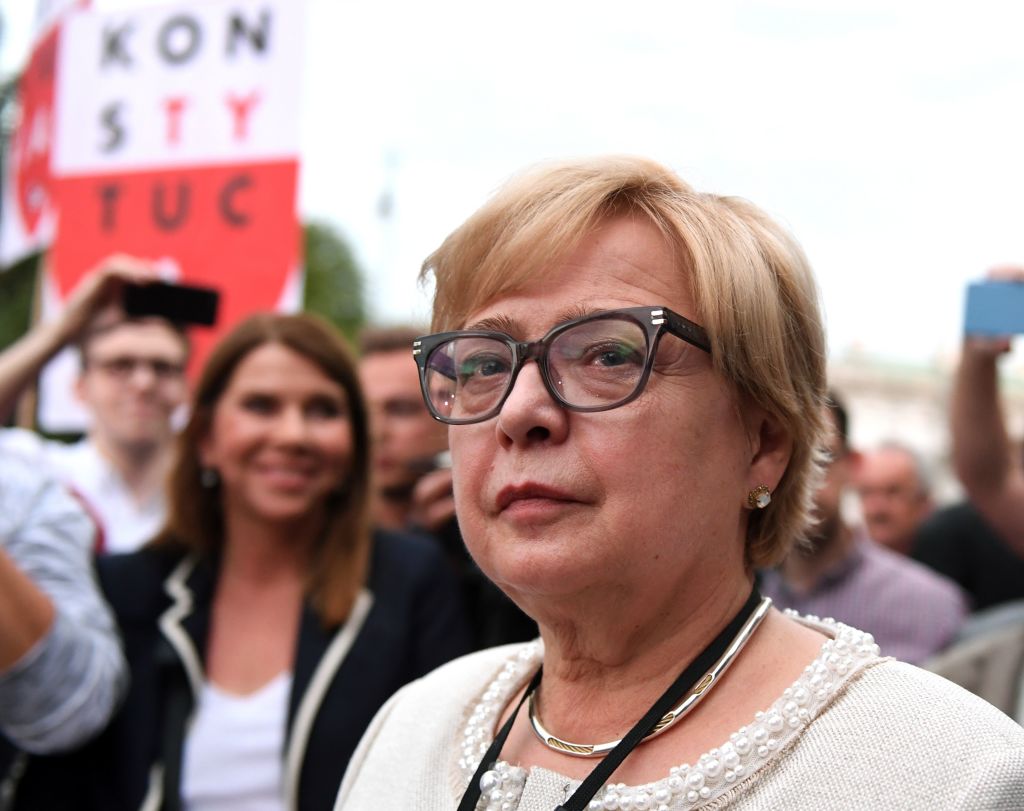Top Polish Supreme Court justice refuses to quit amid chaotic judicial purge


A free daily email with the biggest news stories of the day – and the best features from TheWeek.com
You are now subscribed
Your newsletter sign-up was successful
On Wednesday, a new law in Poland took effect that aimed to force more than a third of the country's Supreme Court into early retirement, allowing the ruling right-wing Law and Justice Party to take control of the last part of the judiciary it hasn't already subsumed. But many of the 27 targeted justices refused to step down, and Supreme Court president Malgorzata Gersdorf defiantly showed up to work, telling a crowd of supporters that she's "doing this to defend the rule of law and to testify to the truth about the line between the Constitution and the violation of the Constitution."
The government said it won't allow Gersdorf or other holdout judges to rule on any cases. Gersdorf, whose term is supposed to last until 2020, ended the day by saying she is going on "vacation," leaving Justice Josef Iwulski in charge. President Andrzej Duda had accepted Iwulski's petition to stay on the court — the law lowered the mandatory retirement age to 65 from 70; Iwulski is 66, Gersdorf is 65 — but Iwulski added to the confusion by saying "Duda neither appointed me, nor did he entrust any duties to me."
The Law and Justice Party, which has systematically taken control of the lower courts and Constitutional Court since winning power in 2015, says it's making the judiciary more responsive to the will of voters and ousting judges who were appointed when Poland was still Communist. Tens of thousands of Poles protested the Supreme Court purge, including one of the men who wrote Poland's Constitution, and Lech Walsea, a former president and the leader of the Solidarity movement that toppled Poland's Communist government in the 1980s. "Whoever turns against the Constitution, against the separation of powers, is a criminal," Walsea said Wednesday afternoon. Walsea also told a radio program that if the government doesn't reverse course, "there will be a civil war. ... This is the path of civil war. I'd like to avoid it."
The Week
Escape your echo chamber. Get the facts behind the news, plus analysis from multiple perspectives.

Sign up for The Week's Free Newsletters
From our morning news briefing to a weekly Good News Newsletter, get the best of The Week delivered directly to your inbox.
From our morning news briefing to a weekly Good News Newsletter, get the best of The Week delivered directly to your inbox.
A free daily email with the biggest news stories of the day – and the best features from TheWeek.com
Peter has worked as a news and culture writer and editor at The Week since the site's launch in 2008. He covers politics, world affairs, religion and cultural currents. His journalism career began as a copy editor at a financial newswire and has included editorial positions at The New York Times Magazine, Facts on File, and Oregon State University.
-
 What is the endgame in the DHS shutdown?
What is the endgame in the DHS shutdown?Today’s Big Question Democrats want to rein in ICE’s immigration crackdown
-
 ‘Poor time management isn’t just an inconvenience’
‘Poor time management isn’t just an inconvenience’Instant Opinion Opinion, comment and editorials of the day
-
 Bad Bunny’s Super Bowl: A win for unity
Bad Bunny’s Super Bowl: A win for unityFeature The global superstar's halftime show was a celebration for everyone to enjoy
-
 ABC News to pay $15M in Trump defamation suit
ABC News to pay $15M in Trump defamation suitSpeed Read The lawsuit stemmed from George Stephanopoulos' on-air assertion that Trump was found liable for raping writer E. Jean Carroll
-
 Judge blocks Louisiana 10 Commandments law
Judge blocks Louisiana 10 Commandments lawSpeed Read U.S. District Judge John deGravelles ruled that a law ordering schools to display the Ten Commandments in classrooms was unconstitutional
-
 ATF finalizes rule to close 'gun show loophole'
ATF finalizes rule to close 'gun show loophole'Speed Read Biden moves to expand background checks for gun buyers
-
 Hong Kong passes tough new security law
Hong Kong passes tough new security lawSpeed Read It will allow the government to further suppress all forms of dissent
-
 France enshrines abortion rights in constitution
France enshrines abortion rights in constitutionspeed read It became the first country to make abortion a constitutional right
-
 Texas executes man despite contested evidence
Texas executes man despite contested evidenceSpeed Read Texas rejected calls for a rehearing of Ivan Cantu's case amid recanted testimony and allegations of suppressed exculpatory evidence
-
 Supreme Court wary of state social media regulations
Supreme Court wary of state social media regulationsSpeed Read A majority of justices appeared skeptical that Texas and Florida were lawfully protecting the free speech rights of users
-
 Greece legalizes same-sex marriage
Greece legalizes same-sex marriageSpeed Read Greece becomes the first Orthodox Christian country to enshrine marriage equality in law
